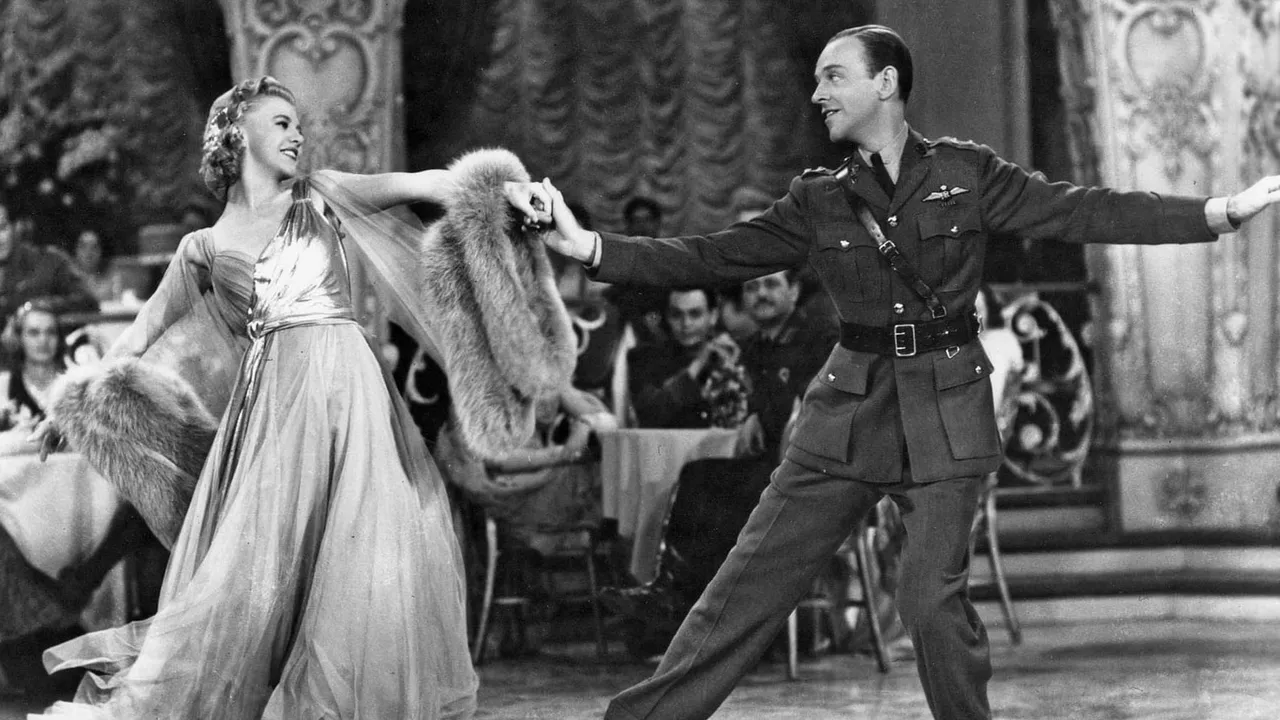
While it is always commendable when film stars try different things, such experiments don’t always succeed, especially when their fans receive something completely different from what they have expected. This happened even to Fred Astaire and Ginger Rogers, legendary film dancing couple, with The Story of Vernon and Irene Castle, a 1938 film directed by H. C. Potter, which turned out to be their penultimate screen pairing and the last one made by RKO Pictures.
All previous Astaire-Rogers films were musical comedies, but The Story of Vernon and Irene Castle is actually a biopic. It is based on My Husband and My Memories of Vernon Castle, two books by American dancer Irene Castle. The plot begins in 1911 New York City, where British-born vaudeville actor Vernon Castle (played by Astaire) makes ends meet as an unknown bit player in a crude comedy act by Lew Fields (playing himself). When he meets beautiful aspiring dancer Irene Castle (played by Rogers), he reveals himself to having great dance talent. They marry and, by happy coincidence, give an invitation to perform in Paris. Their performing career, however, goes nowhere until they are discovered by Maggie Sutton (played by Edna May Oliver), an agent who arranges their performance in the prestigious Café de Paris. There they create a sensation and almost instantly gain fame and fortune. They not only popularise a new dance called the Foxtrot, but Irene proves to be a successful and influential designer of new fashion and hairstyles. Their happy life together is cut short by the start of the Great War in 1914. Vernon, being British, feels obligated to take part and join the Royal Flying Corps, flying increasingly dangerous missions over the Western Front. When the United States joins the war, Irene starts helping the war effort by selling bonds and making silent propaganda films. When Vernon is recalled from the front to help train American pilots, Irene hopes that she would finally reunite with him, but fate has other plans.
The Castles were immensely successful and influential supercouple that enjoyed the status of icons of American popular culture and were among the few that had achieved that through dance. Fred Astaire and Ginger Rogers, another iconic dance couple, seemed like the perfect choice to embody them on screen. Competently directed by H. C. Potter, The Story of Vernon and Irene Castle works best in the first half, when it resembles musical comedies that had made Astaire and Rogers famous. The quality of music, however, looks inferior and otherwise great character actor Walter Brennan tries a little bit too hard to act as comic relief in the role of Castles’ loyal servant Walter Ash. When the war starts, the tone suddenly gets serious and even less perceptive viewers would know that Vernon Castle is not long for this world. As a reflection of the worsening political situation in Europe that would escalate into another world war a few months after the film’s premiere, The Story of Vernon and Irene Castle depicts the previous global conflict through the lens of patriotism, duty, and almost serves as a propaganda film. As such, its tear-jerking finale probably had an even harder impact on 1930s audiences, accustomed to Astaire and Rogers in escapist fantasies where their characters live happily ever after.
Some of the film’s flaws could be explained by the troubled production. Irene Castle, who was hired as a technical advisor, was infuriated by some creative decisions; her 1910s gowns weren’t allowed to be accurately reconstructed, being considered too risqué for the ultra-prudish MPAA Production Code introduced a few years earlier; and Walter Ash was played by a white actor despite being black in real life. Castle also clashed with Rogers, who refused to dye her hair black or have it shortened in order to look like Castle had looked like. The studio accepted Rogers’ arguments, knowing that the audience would prefer Rogers as a blonde. But it was for naught. The Story of Vernon and Irene Castle was rejected by the audience and flopped at the box office. That was the end of the Astaire-Rogers pairing that would be reunited ten years later in MGM production The Barkleys of Broadway.
RATING: 5/10 (++)
Blog in Croatian https://draxblog.com
Blog in English https://draxreview.wordpress.com/
Leofinance blog @drax.leo
Unstoppable Domains: https://unstoppabledomains.com/?ref=3fc23fc42c1b417
Hiveonboard: https://hiveonboard.com?ref=drax y
Bitcoin Lightning HIVE donations: https://v4v.app/v1/lnurlp/qrcode/drax
Rising Star game: https://www.risingstargame.com?referrer=drax
1Inch: https://1inch.exchange/#/r/0x83823d8CCB74F828148258BB4457642124b1328e
BTC donations: 1EWxiMiP6iiG9rger3NuUSd6HByaxQWafG
ETH donations: 0xB305F144323b99e6f8b1d66f5D7DE78B498C32A7

